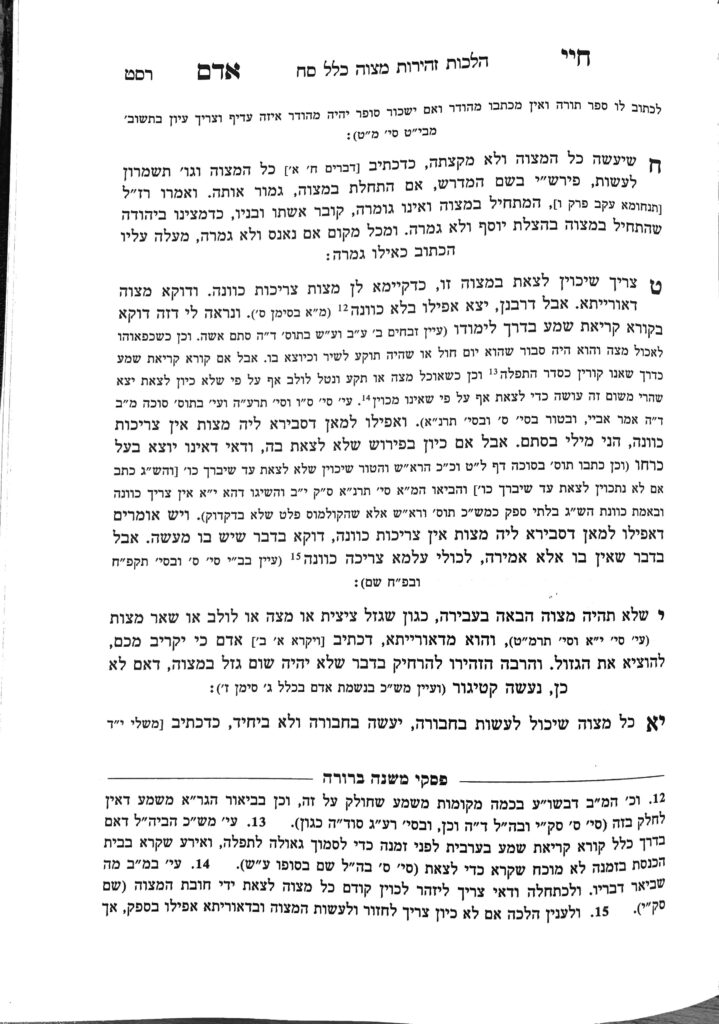We are continuing in siman 9, which discusses the concept of mitzvos tzrichos kavana. We left off with the opinion of the Magen Avraham, who differentiates between a mitzvah deoraysa and a mitzvah derabanan. According to the Magen Avrhaam, if one does not have the proper kavana for a mitzvah deoraysa, they must repeat the mitzvah. If one does not have proper kavana for a mitzvah derabanan, they are nonetheless yotzei.
The Biur Halacha, in siman 60, infers from the Gra that he disagrees, and understands that the Gra holds mitzvos tzrichos kavana applies to both mitzvos deoraysa and derabanan.
Additionally, the Mishnah Berurah brings from the Pri Megadim that the Pri Megadim is unsure how to understand the Magen Avraham. The Magen Avraham could be saying that Chazal never instituted mitzvos tzrichos kavana for mitzvos derabanan (as we understood the Magen Avraham until now). Alternatively, the Magen Avraham could be saying that the conclusion of the Gemara over whether we hold mitzvos tzrichos kavana or not is unclear, so it is a safeik. When we have a safeik, on a mitzvah deroasya we have to be machmir, and on a derabanan we can be meikil. Thus, according to the Gra and one way of understanding the Magen Avraham, mitzvos tzrichos kavana is a din vadai, but according to the other way of understanding the Magen Avraham, it is a safeik.
The Biur Halacha points out an important implication. According to the second understanding of the Magen Avraham, if one is unsure whether they had kavana on a mitzvah deoraysa, we could employ the concept of s’feik s’feika (a double safeik) and exempt a person from repeating the mitzvah. (The halacha is that when one has a s’feik s’feika, over a responsibility or obligation, they are not chayav in it.) However, according to the Gra and the first understanding of the Magen Avraham, that mitzvos tzrichos kavana is a din vadai on a mitzvah deoraysa, they must repeat the mitzvah
The Biur Halacha points out that even if one does repeat the mitzvah, they would not repeat the bracha, because there are enough opinions which understand that one was already yotzei that one should not repeat the bracha.
The Chayei Adam continues, and qualifies that if one does not have clear intent when doing a mitzvah, but it can be understood circumstantially that one did the mitzvah l’sheim mitzvah, it is enough to assume that one had the proper kavana and is yotzei. For example, when one recites a bracha before doing an action, even if they did not have explicit kanava, the fact that they preceded the mitzvah with a bracha is sufficient for us to assume that the action is the l’sheim mitzvah. However, in a scenario of one who is learning, and comes across the paragraphs of Shema, it is not obvious from the context that they are reading Shema for the purpose of being yotzei, so they would not be yotzei without explicit kavana.
Similarly, the Gemara gives the cases of someone blowing shofar for the enjoyment of the sound, or someone forced to eat matzah who does not realize it is Pesach. In these situations, one is not yotzei without explicit kanava. However, if a person is sitting at the seder and eating matzah, blowing shofar in shul, or taking a lulav with all four minim, it is obvious from the context that they are trying to fulfill a mitzvah, and they are yotzei even without kavana.
The Mishnah Berurah gives the example of someone who sits down at the end of their meal to bensh. If they bensh out loud to help their children bensh, they would not necessarily be yotzei, because it is not clear from the context that they are fulfilling the mitzvah of birchas hamazon. However, if they are eating alone, the only reason they would bensh after a meal is to fulfill the mitzvah of birchas hamazon, so they are yotzei.
Summary
- According to the Magen Avraham, if one does not have kavana on a mitzvah deoraysa they need to repeat the mitzvah, but they do not need to repeat it for a mitzvah derabanan.
- The Gra disagrees and holds that even by a mitzvah derabanan one would have to repeat.
- The Pri Megadim suggests that maybe the Magen Avraham means to say that since mitzvos tzrichos kavana is a safeik how we pasken, one must be machmir on a deorasya and may be meikil on a derabanan.
The practical implication would be a case of someone who is unsure whether they had kavana.
- In a case that if it is clear from the context or circumstances that one is doing this action to fulfill a mitzvah, they are yotzei even for a mitzvah deoraysa.



